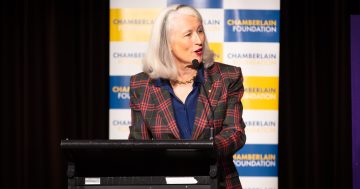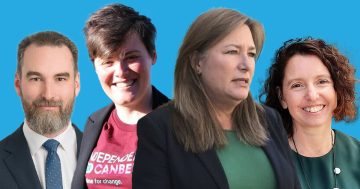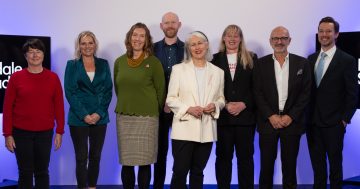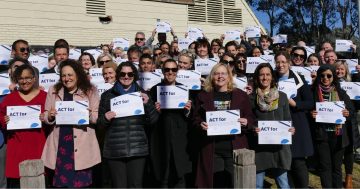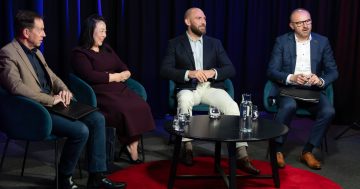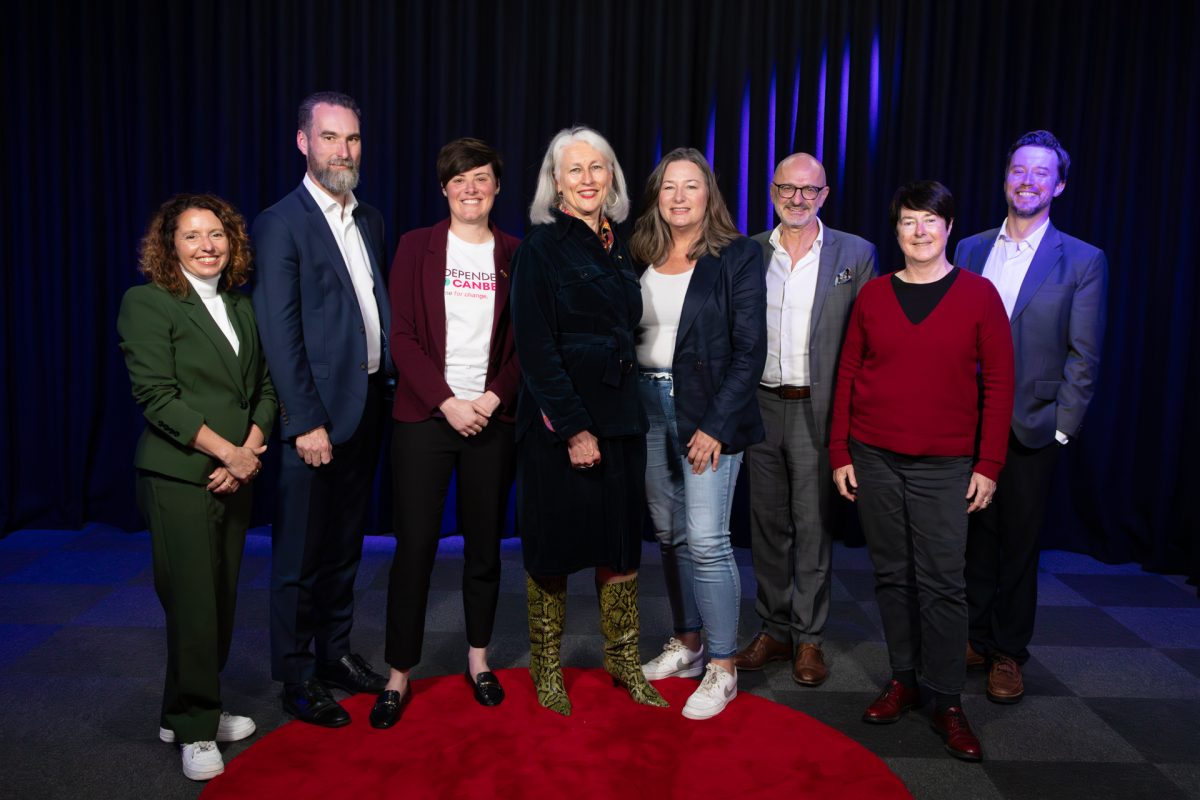
Debate participants: the Greens’ Rebecca Vassarotti, Liberals’ Ed Cocks, Independents for Canberra’s Dr Vanessa Picker, moderator Genevieve Jacobs, Labor’s Yvette Berry and expert panellists Archie Tsirimokos, Professor Chris Wallace and Dr Devin Bowles before the start of the Canberra Decides debate. Photo: Michelle Kroll.
The creation of an ACT Government-run bank, holding a poverty summit and freezing rates were proposed to combat the rising cost of living at the third of three Region Canberra Decides election debates held at the Lonsdale St Studio on Wednesday night (25 September).
Independents for Canberra candidate in Brindabella Dr Vanessa Picker, ACT Greens Deputy Leader and Kurrajong candidate Rebecca Vassarotti, Liberals Murrumbidgee MLA Ed Cocks and Deputy Chief Minister and Ginninderra MLA Yvette Berry mostly stuck to party talking points in a discussion that rarely got feisty.
However, some left-field suggestions on how to tackle the affordability crisis from expert panellist Professor Chris Wallace of the University of Canberra enlivened the evening.
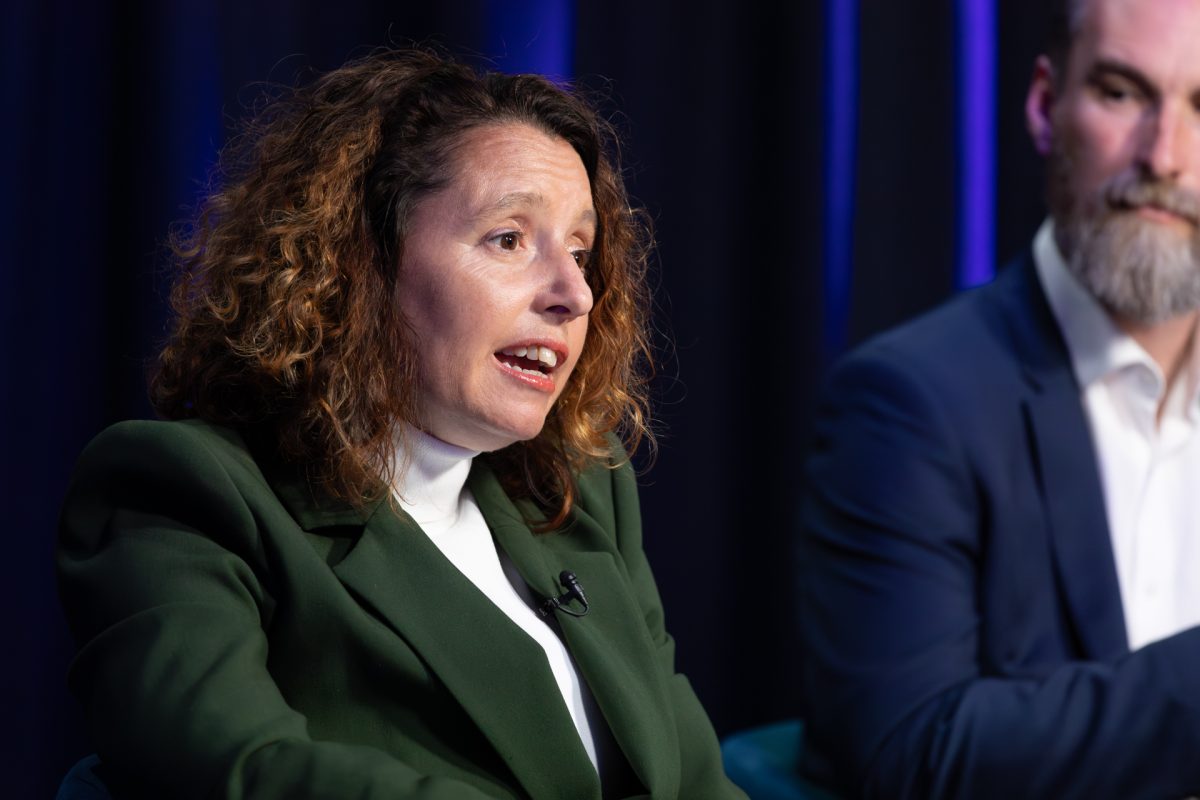
ACT Greens’ Rebecca Vassarotti: “We need to look at what are the essential services that government should be in the business of doing.” Photo: Michelle Kroll.
Throughout the debate, the rising cost of rent and mortgages were given as a key reason some Canberrans were now choosing between “heating and eating”.
Professor Wallace noted we used to have ‘state banks’ in Australia, where governments ran financial institutions themselves and offered loans to low-income earners at lower than market rates. She asked the participants if the ACT Government should get into the banking businesses.
Rebecca Vassarotti loved the idea.
“I think we need to look at nationalisation of services and universal services. It’s a really good idea,” she said.
“I think people have an obsession with credit ratings. It seems that we are held hostage to credit ratings, which means we haven’t provided essential infrastructure.”
She kept coming back to government intervention as a solution.
“We don’t think provided vouchers and coupons is the way to go. We need to look at what are the essential services that government should be in the business of doing.”
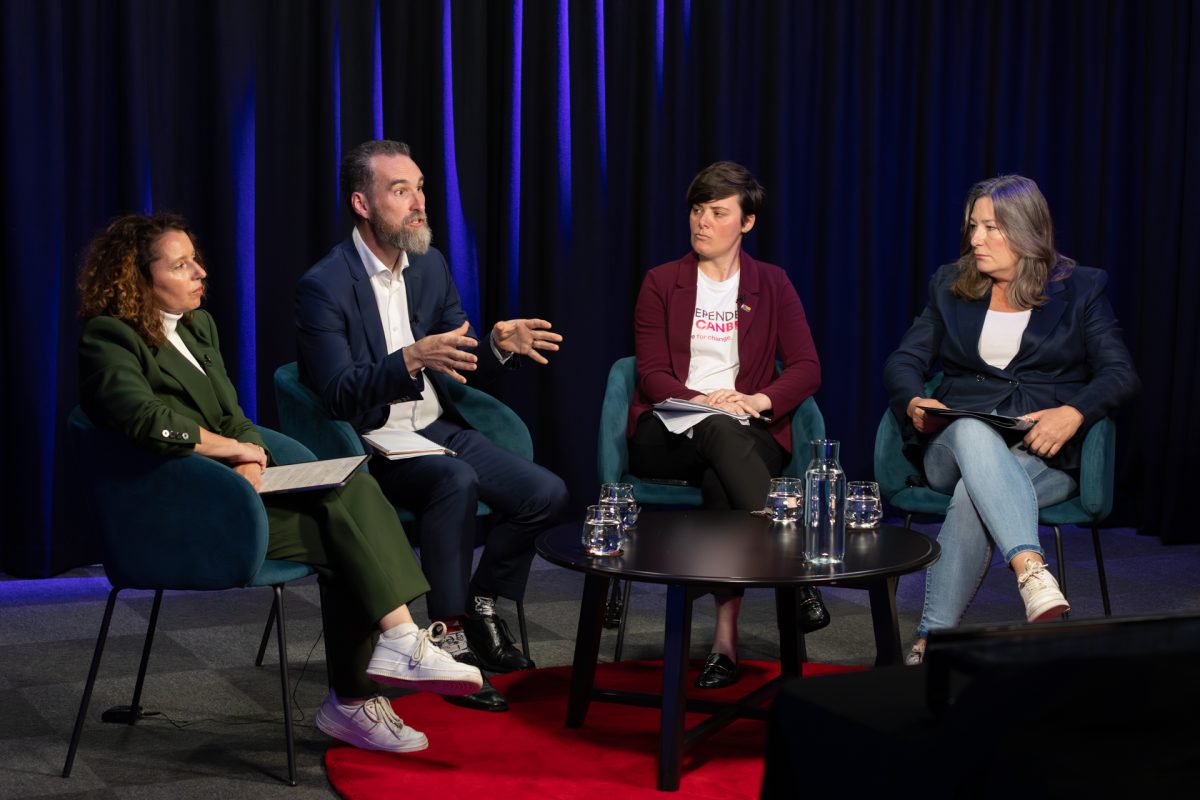
Canberra Liberals’ Ed Cocks: “I would love to slash rates, but we have to take a fiscally responsible step of controlling them and keeping them under inflation.” Photo: Michelle Kroll.
While no other participant gave a clear endorsement of the state bank concept, all four agreed with another of Ms Wallace’s ideas – that a poverty summit be held in Canberra after the election.
“I think nearly all of you used the term ‘doing it tough’. What I want to ask, is that a shockingly unhelpful euphemism about that’s going on in Canberra?
“Should we start talking about Canberrans living in poverty? Is there a case post-election for having a poverty summit in Canberra, really seeing and naming the problem?” Professor Wallace asked.
“Why not? There are too many people living in poverty now,” Mr Cocks responded, with the other three politicians giving similar answers.
Moderator Genevieve Jacobs also asked candidates if they’d support a shorter-term remedy to rising household bills – freezing local government rates. Nobody gave clear support for this proposal.
“What we’ve done to address [cost of living] is announcements like $800 off energy bills for people who are on low incomes… we have transparency where people can see where their rates go, they see it’s going to health and education,” Ms Berry said.
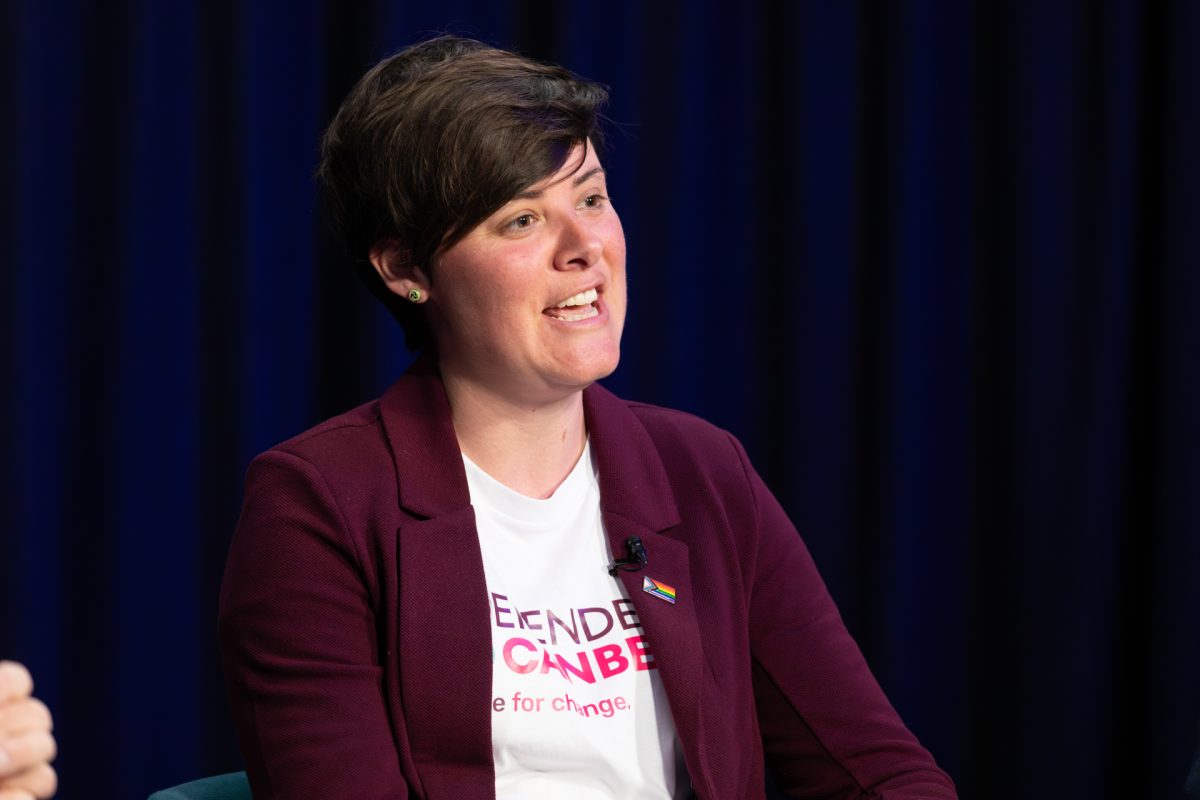
Independents for Canberra’s Dr Vanessa Picker: “There seems to be a black box in terms of where rates have been going.” Photo: Michelle Kroll.
Dr Picker challenged this assertion.
“We need to address the root causes of problems. Temporarily [freezing rates] could be a good thing, but … it’s not about what we’re doing with rates as the figure. I’d pull back on [Ms Berry’s claims on] transparency. I’m in Brindabella. There seems to be a black box in terms of where rates have been going.”
Mr Cocks gave a nuanced answer.
“If it were up to me and we had all the money in the world, I would love to slash rates, but we have to take a fiscally responsible step of controlling them and keeping them under inflation … we have to get into government and look behind the scenes and understand what the real picture of the territory budget is before we can fix things,” he said.
Like Mr Cocks, Dr Picker blamed government for contributing to cost-of-living problems.
“We have a lot of headline-grabbing and sometimes quite bizarre policies. We need to go to the evidence. We need independents to bring about accountability … we can’t ignore the elephant in the room that there has been an awful lot of waste over the last 23 years that has come about through a lot of ineffective and inefficient policies,” she said.
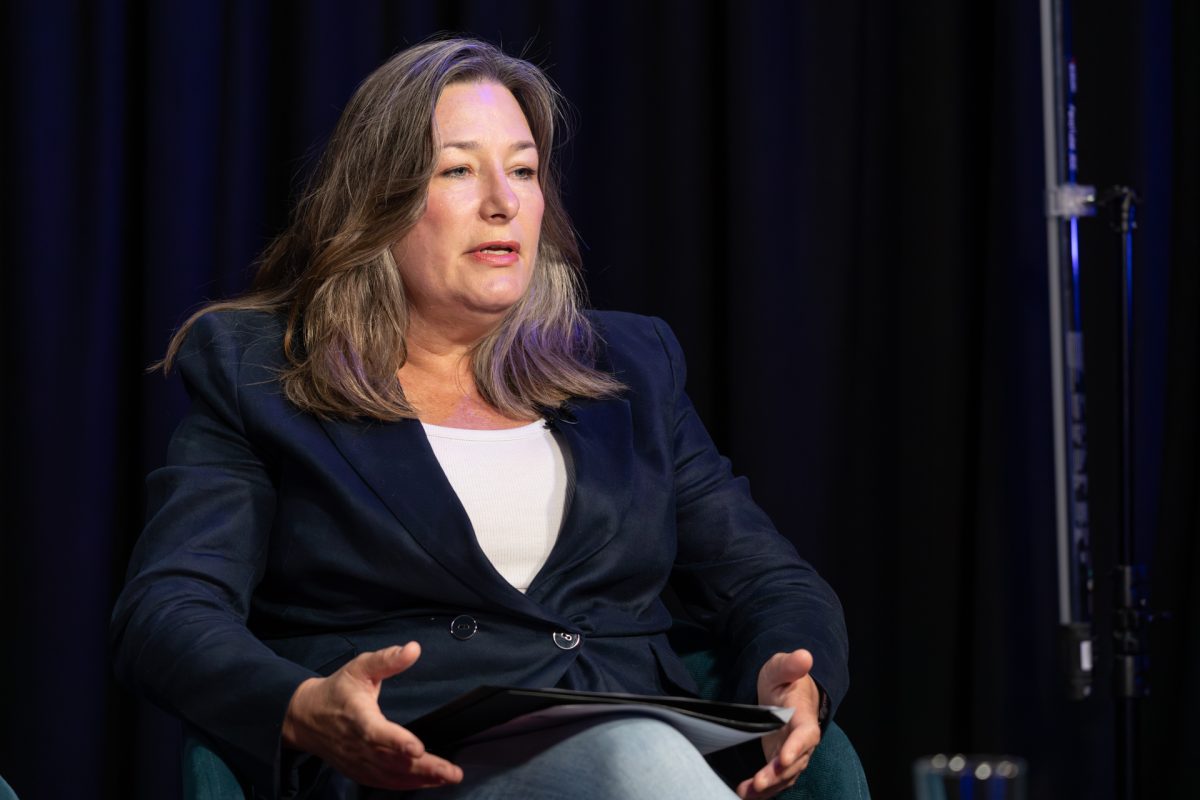
Yvette Berry: “What we’ve done to address [cost of living] is announcements like $800 off energy bills for people who are on low incomes.” Photo: Michelle Kroll.
An online poll found 49 per cent of viewers believed Labor’s Yvette Berry gave the best up-front pitch on Canberra’s future, well ahead of her nearest rival, the Liberals’ Ed Cocks (29 per cent).
By the end of the debate, 50 per cent of respondents said they’d vote for the Canberra Liberals, 21 per cent Labor, 14 per cent for the Independents and 11 per cent for the Greens.
All three Region Canberra Decides election debates are available to watch on Region’s YouTube channel.












